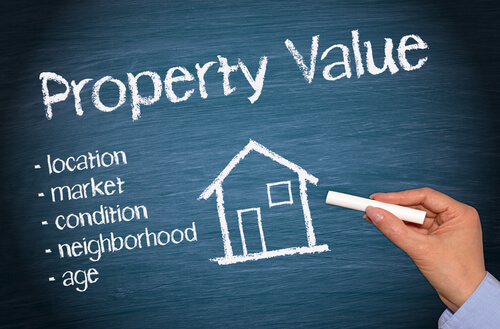

Published: October 2017
Author: Bank of England Mortgage Staff
 You were pre-qualified for a loan, made an offer on your dream home, and it has been accepted! The question is whether or not the home is actually worth what you have agreed to pay. This is where the home appraisal comes into play.
You were pre-qualified for a loan, made an offer on your dream home, and it has been accepted! The question is whether or not the home is actually worth what you have agreed to pay. This is where the home appraisal comes into play.
What Is An Appraisal?
A home appraisal is the expert opinion of a certified, state-licensed professional who determines the value of a piece of property. An appraisal protects the lender from paying too much for a property that is worth less than they have invested and protects the buyer from spending too much on a home that they fell in love with at first sight. It is an unbiased, professional opinion on the value of a home.
It may take longer than you expect. The standard turn time for FHA, Conventional, and USDA loans is five business days depending on the area. For VA loans, it is ten business days. The actual inspection of the home can take only a couple of hours, but the appraiser must also prepare the comparables and other documents which can take several days.
Why Are They Required?
Lenders require an appraisal mostly to ensure that they are making a wise investment. Just because the seller and buyer have come to an agreement, it ultimately is the lender that will be paying for it. It is their safety net.
As the buyer, you will be paying for the appraisal. The majority of the time, the fee is wrapped into your closing costs. The appraiser works for the lender, however, and are required to remain independent of the buyer. This is to ensure that the appraiser remains ethical in the value they determine; in fact, it is a crime to attempt to coerce an appraiser into reaching a certain value.
Appraisal vs. Inspection
This category is comprised of FHA, VA and USDA loans. FHA loans are insured by the Federal Housing Administration. VA loans are guaranteed by the U.S. Department of Veterans Affairs. USDA loans are backed by the U.S. Department of Agriculture. USDA loans are also called RD or Rural Development loans, after the USDA division that handles them.
Jumbo Loan
It is important to note that a home appraisal is not the same thing as a home inspection. A home inspection is significantly more in depth than an appraisal. In purchasing a home, it is suggested to also get an inspector to come look at the home. They inspect things that could turn into potential nightmares once you own the home, such as checking to see if the plumbing is up to code and testing the heat and air. Appraisers examine more obvious physical issues. The appraisal value is determined by the location, upgrades, size, age of the home, and most importantly the comparables. Comparables or "Comps" are nearby homes that are similar in size and features to the home being appraised.
The appraiser should not take into account curb appeal and general tidiness of the home. Despite this, it is possible for it to affect their overall opinion when there are dirty dishes in the sink and an overgrown yard. To ensure a smooth home appraisal, it is wise to tidy up the home and make the small maintenance repairs that you have been putting off – give the walls a new coat of paint, clear away clutter, and plant new flowers.
What if you received a low appraisal?
Let's say you and the seller agree on $200,000, but the appraisal comes in for $150,000 – what do you do? The lender will not give more than the appraised value, so that leaves you with a couple options.
First, you could try to get the appraiser to take a second look at the property after you have completed repairs and maintenance. Sometimes the appraiser will ask for more comps in the area, and that is when it is your job to start doing research and find homes in the area with similar values. If that does not work, you always have the option to get a second appraisal. You will have to pay for this, but it is possible that a different appraiser will have a different opinion on the home.
Another option is to come up with the extra cash to cover the difference between the appraisal and the offer price. If you don't have the cash on hand, you could also ask the seller to cover the difference. This is a common solution, because it means the house is overpriced in the first place.
If all of these options do not work and the appraisal is still too far below what can be financed, then you may be left to cancel the transaction. There most likely is a loan contingency which allows you to cancel the contract and get your deposit back. Keep in mind, that this may be beneficial and keeping you from overpaying for a home.
If you have any questions at all in regards to home mortgages, please don't hesitate to contact BOE Mortgage!